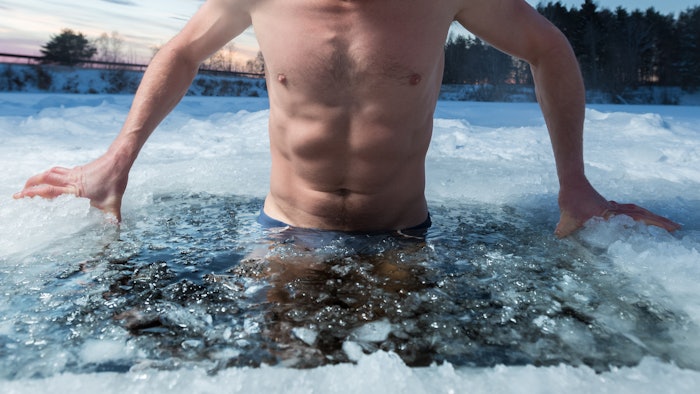
Cold plunges, cryo chambers, ice baths—you name it! Cold therapy is all the rage right now.
According to Spate, consumers are looking to experience cold plunges in spa and at home, with an average of 88,200 searches every month in the US for "ice bath." They're looking to address a range of common health concerns, from muscle recovery and reduced inflammation to weight loss and even anxiety relief.
We're taking a look at all the benefits—and potential downsides—of this popular wellness practice.
Pros of Cold Plunges
There are advantages to ice bathing, particulary for athletes. The practice can help improve sports performance and elevate mood, as it helps reduce muscle soreness and flush out lactic acid buildup.
Cold plunges also constrict blood vessels, which can decrease swelling and inflammation. This can result in less muscle damage from certain, more strenuous workouts, such as high-intensity interval training (HIIT).
Related: 4 Cold Plunge Experiences from Top Destinations
Ice bathing has been a spiritual practice in numerous cultures for ages. In the Caribbean, cold water immersion has been used to promote clarity and relaxation, while Native American cultures often incorporated it into grounding rituals that connect people with nature.
It's also believed that freezing water clears away negative or stagnant energy. (Refinery29 has a great piece about indigenous ice bathing and the importance of respecting the communities that practice it.)
Some studies have found that combining cold water immersion, meditation and breathwork can result in immune support, but they couldn't isolate which practice had the biggest impact. Similarly, cold-water swimming demonstrated elevated mood and reduced stress, but those results are also linked to exercise in general.
Related: 3 Mindful Cold Plunge Experiences from Auberge
The good news is that the experience will depend on the person, meaning that you can tailor cold plunges to meet the needs of each individual guest. Athletes may want ice baths immediately after a strenous training session, while a more spiritually interested client would be better off with a meditation and cold plunge combo. There's something for everyone!
Cons of Cold Plunges
Unfortunately, there are downsides to cold plunging, especially for the inexperienced or those with certain health conditions.
Ice bathing for 20 minutes or more can cause hypothermia, characterized by a loss of strength and coordination. The risk of hypothermia is also the reason why temperatures must be closely monitored so that they don't go below 50°-68°F.
For that reason alone, at-home ice baths should be discouraged for amateur bathers and those unable to monitor those factors.
Cold plunges also directly affect blood flow, so the practice is incredibly risky for people with heart conditions. The shock to the body can make pumping blood more strenuous for the heart, among other issues.
Research has indicated that the reported benefits of a post-workout ice bath are related to the placebo effect, and that it may even stunt muscle repair and growth. Ice baths can also be painful, simply because such low temps are shocking and uncomfortable for the body.
Again, it depends on the individual. As long as these potential issues are accounted for, there's not reason why you can't happily provide cold water immersion sessions to guests who enjoy them.
References
https://www.thekewlshop.com/blogs/news/8-pros-and-cons-of-ice-bathing
https://www.bannerhealth.com/healthcareblog/teach-me/ice-baths-are-they-worth-it
https://www.refinery29.com/en-us/2023/04/11367690/cold-plunge-benefits-latin-america-history
https://www.huffpost.com/entry/cold-plunge-health-benefits_l_644684bfe4b039ec4e800163

![[VIDEO] An Osmosis Facial Infusion Treatment Step-by-Step](https://native-x.imgix.net/allured/663137812f619a000179e394/Thumbnail-Sized.jpg?crop=focalpoint&fit=crop&fp-x=0.5&fp-y=0.5&h=191&w=340&auto=format%2Ccompress&q=70)









